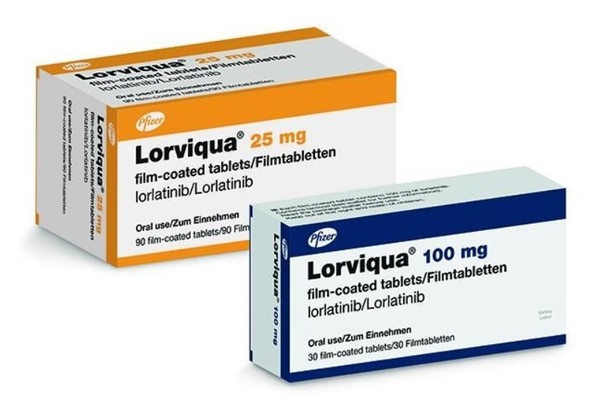Pfizer’s Lorviqua (ingredient: lorlatinib), a third-generation anaplastic lymphoma kinase (ALK) targeted therapy, passed the review for health insurance coverage for the treatment of adult patients with ALK-positive advanced non-small-cell lung cancer (NSCLC).
On Thursday, the Health Insurance Review and Assessment Service (HIRA) released the results of the drugs benefit appraisal committee’s meeting.

Pfizer developed Lorviqua as a follow-up drug of Xalkori (crizotinib), the first treatment for ALK-positive NSCLC.
The FDA authorized marketing approval for Lorviqua in November 2018, but the Korean regulator gave the nod in July 2021.
The late approval in Korea was due to the difficulty of conducting a large-scale phase 3 trial when ALK-positive NSCLC patients were in small numbers.
Lorviqua obtained the license in most countries based on phase 2 trial results.
It won the green light only after the Ministry of Food and Drug Safety introduced the conditional approval system in Korea.
Lorviqua had another issue in the regulator’s reimbursement review despite the marketing approval.
Lorviqua is indicated as monotherapy for adult patients with ALK-positive advanced NSCLC who received alectinib (Alecensa) or ceritinib (brand name: Zykadia) as the first ALK inhibitor therapy or those who received crizotinib and at least one other ALK inhibitor.
However, Lorviqua is not indicated for patients whose disease progressed after using Alunbrig (brigatinib) as the first-line therapy.
In Korea, the first-line treatment of ALK-positive advanced NSCLC is mostly done with two second-generation drugs – Alecensa and Alunbrig.
If Lorviqua gets health insurance benefits as indicated for approval, patients who developed resistance after Alunbrig use will not have any other option to use a reimbursed treatment.
A related medical society pointed out this issue in a written letter to HIRA. As a result, HIRA allowed Alunbrig user patients to get Lorviqua reimbursement, reflecting the expert opinion.
Pfizer plans to enter price negotiations for Lorviqua with the National Health Insurance Service (NHIS). If they complete the talks within the 60-day deadline, Lorviqua could get insurance benefits within the first half of the year after the authorization of the Health Insurance Policy Deliberation Committee.
The HIRA’s drugs benefit appraisal committee also recognized the validity of reimbursement for sonazoid (perfluorobutane), used in ultrasound of liver cancer, and Dopa Check (fluorodopa 18F), used in PET scans if the pharmaceutical companies accept prices of the two drugs lower than the appraised amount from the panel.

